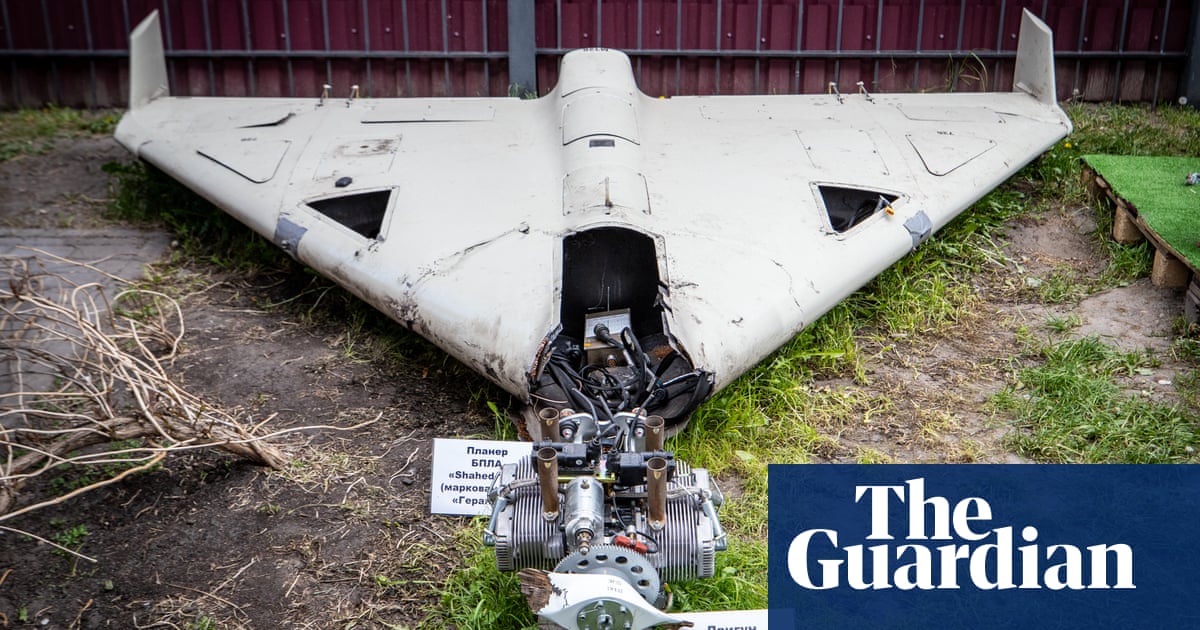
Brussels has warned European companies and governments that it could ban the sale of certain components to Turkey and other countries from where Iran and Russia are sourcing parts for drones and other weapons striking Ukrainian cities.
The comments from the European Commission follows a leak to the Guardian of a 47-page document in which the Ukrainian government detailed the use of western technology and appealed for long-range missiles to attack drone production sites in Russia, Iran and Syria.
The Ukrainian paper, submitted to the G7 governments in August, claimed there had been 600 raids on cities using unmanned aerial vehicles (UAVs) containing western technology in the previous three months.
Five European companies including a Polish subsidiary of a British multinational were named as the original manufacturers of the identified components.
There is no suggestion of any wrongdoing by the western companies whose parts were identified. “Iranian UAV production has adapted and mostly uses available commercial components, the supply of which is poorly or not controlled at all,” the paper said.
Customs information was said to show that “almost all the imports to Iran originated from Turkey, India, Kazakhstan, Uzbekistan, Vietnam and Costa Rica”.
A European Commission spokesperson said evidence that components were being sourced via such countries showed that EU sanctions were creating “significant pressure on their targets” but there needed to be tougher enforcement by member states.
He said: “This means keeping a close eye on foreign operators that are re-exporting EU sanctioned goods without the knowledge of the EU exporter. For that scenario, we have sought the support of third countries’ authorities to make sure that goods exported from the EU to those countries do not reach Russia.
“The EU sanctions envoy, David O’Sullivan, is working closely with third-country jurisdictions to ensure that our sanctions are not circumvented.”
The spokesperson said this initiative had shown some “first tangible results” and a “priority list of sanctioned battlefield goods” had been drawn up “to which businesses should apply particular due diligence and which third countries must not export to Russia”.
He added: “In some cases, however, these diplomatic efforts may prove to be insufficient, or there may simply not be any willingness to make them. If nothing else works then the only remaining option is to stop exporting to those third countries the very specific goods we are most concerned about, using the EU’s anti-circumvention tool. This tool would allow the EU to prohibit the export of these goods to the countries which are used to circumvent our sanctions, and also to prohibit the provision of associated services.
“The 10th sanctions package included for the first time seven Iranian entities that have been using EU components and providing Russia with military Shahed drones to attack civilian infrastructure in Ukraine. This should act as a strong deterrent to other companies and international traders that circumvention of export restrictions will not be tolerated.”
Among the European-made items found in Shahed-131 and 136 drones used by Russia in Ukraine were fuel pumps, transistors, power management circuits and microprocessors.
The UK shadow defence secretary, John Healey, urged the British government to work closely with the commission on the issue.
He said: “It is a serious concern that western-made components continue to turn up in weapons used by Russia to wage its brutal and illegal invasion of Ukraine. Ukraine is right to expose such dual-use technologies and it must be a priority to support their fight by closing loopholes in sanctions regimes. The government should work with allies and partners, like the European Commission, to ensure the flow of parts is cut off.”
Vladyne Vlasiuk, a sanctions adviser working within the office of Ukraine’s president Volodymr Zelenskiy, said the current situation regarding the drone components was “frustrating” and that lobbying efforts had been ongoing since June.
He said: “Of course, it is hard to explain to the people of Ukraine and to the servicemen in the trenches how it is possible that our partners that help so much are also letting those microelectronics come to Russia to make the arms”.
A UK government spokesperson said they had imposed “the largest and most severe economic sanctions” on the Russian economy and would work with western partners to tighten controls.
He said: “We are clear that any UK company or their subsidiaries that are found to be selling or exporting sanctioned goods to Russia, directly or indirectly, could be in breach of sanctions law and could face a heavy fine or imprisonment.
“We are working closely with partners to coordinate measures and keep our sanctions under review - including addressing issues around potential circumvention.”












